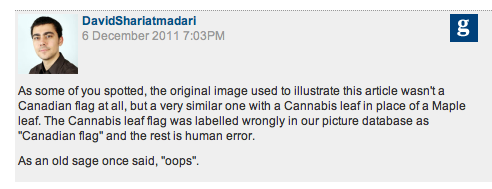![]() We lost the war on drugs by Suzanne Wills, Austin Statesman.
We lost the war on drugs by Suzanne Wills, Austin Statesman.
![]() Mhy Mother-in-Law’s One High Day by Marie Myung-OK Lee in the New York Times
Mhy Mother-in-Law’s One High Day by Marie Myung-OK Lee in the New York Times
![]() Video: Narco-Mania! – the Beatles, Yoko Ono, and the drug war in Mexico. In Spanish. Quite entertaining, even though I don’t understand it. Anyone want to give a quick re-cap? (Via Anthony Papa)
Video: Narco-Mania! – the Beatles, Yoko Ono, and the drug war in Mexico. In Spanish. Quite entertaining, even though I don’t understand it. Anyone want to give a quick re-cap? (Via Anthony Papa)
Update: Anthony Papa sent me this English subtitled version
The human race reflects a myriad of vibrant cultures and unique identities, yet we are united by the innate liberties that are our common birthright. The rights to assemble peacefully, to speak and worship as we please, and to determine our own destinies know no borders. All people should live free from the threat of extrajudicial killing, torture, oppression, and discrimination, regardless of gender, race, religion, nationality, sexual orientation, or physical or mental disability.
Dictators seek to constrain these liberties through repressive laws and blunt force, but hope cannot be imprisoned and aspirations cannot be killed. […]
NOW, THEREFORE, I, BARACK OBAMA, President of the United States of America, by virtue of the authority vested in me by the Constitution and the laws of the United States, do hereby proclaim December 10, 2011, as Human Rights Day and the week beginning December 10, 2011, as Human Rights Week. I call upon the people of the United States to mark these observances with appropriate ceremonies and activities.



